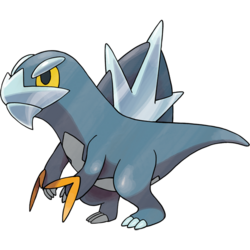From Bulbapedia, the community-driven Pokémon encyclopedia.
|
|
| Line 53: |
Line 53: |
| ===Minor appearances=== | | ===Minor appearances=== |
|
| |
|
| ==In the manga== | | ==In the manga==<!-- |
| ==In the TCG== | | ==In the TCG== |
| {{main|Arctibax (TCG)}} | | {{main|Arctibax (TCG)}}--> |
|
| |
|
| ==Game data== | | ==Game data== |
Revision as of 11:57, 20 January 2023
Arctibax (Japanese: セゴール Segōru) is a dual-type Dragon/Ice Pokémon introduced in Generation IX.
It evolves from Frigibax starting at level 35 and evolves into Baxcalibur starting at level 54.
Biology
Arctibax is a bluish gray theropod-like Pokémon, with a jagged light blue pattern on its underside, a medium-sized tail, and a large, triangular, dark gray dorsal fin on its back. Its eyes have yellow sclerae and black pupils, and it has three bluish-white claws on its hands and feet, along with long, thin, V-shaped orange quills on the backs of its hands. It is capable of freezing its surrounding air, forming an ice mask over its mouth and eyes — the latter resembling eyebrows — to protect itself. It also encases its dorsal fin in sharp ice spikes, forming a blade of ice. Arctibax has strong back and leg muscles, which allow it to do a front flip while airborne and attack opponents with its dorsal fin.
Arctibax and its evolutionary relatives are the only known Pokémon that can have Thermal Exchange as an Ability.
In the anime
Major appearances
Minor appearances
In the manga
Game data
Pokédex entries
| This Pokémon was unavailable prior to Generation IX.
|
| Generation IX
|
|
|
Paldea
#389
|
| Scarlet
|
Arctibax freezes the air around it, protecting its face with an ice mask and turning its dorsal fin into a blade of ice.
|
| Violet
|
It attacks with the blade of its frozen dorsal fin by doing a front flip in the air. Arctibax's strong back and legs allow it to pull off this technique.
|
|
|
Game locations
| This Pokémon was unavailable prior to Generation IX.
|
|
|
In side games
Held items
Stats
Base stats
| Stat
|
Range
|
| At Lv. 50
|
At Lv. 100
|
90
|
|
150 - 197
|
290 - 384
|
95
|
|
90 - 161
|
175 - 317
|
66
|
|
63 - 129
|
123 - 254
|
45
|
|
45 - 106
|
85 - 207
|
65
|
|
63 - 128
|
121 - 251
|
62
|
|
60 - 125
|
116 - 245
|
Total: 423
|
Other Pokémon with this total
|
- Minimum stats are calculated with 0 EVs, IVs of 0, and (if applicable) a hindering nature.
- Maximum stats are calculated with 252 EVs, IVs of 31, and (if applicable) a helpful nature.
|
Type effectiveness
| Under normal battle conditions in Generation IX, this Pokémon is:
|
|
|
|
|
|
|
|
|
|
|
|
|
Learnset
|
|
|
|
- Bold indicates a move that gets STAB when used by Arctibax
- Italic indicates a move that gets STAB only when used by an Evolution of Arctibax
|
|
|
|
|
- Bold indicates a move that gets STAB when used by Arctibax
- Italic indicates a move that gets STAB only when used by an Evolution or an alternate form of Arctibax
|
|
|
|
|
- Moves marked with an asterisk (*) must be chain bred onto Arctibax
- Bold indicates a move that gets STAB when used by Arctibax
- Italic indicates a move that gets STAB only when used by an Evolution of Arctibax
|
|
|
|
|
- Bold indicates a move that gets STAB when used by Arctibax
- Italic indicates a move that gets STAB only when used by an Evolution of Arctibax
|
Side game data
Evolution
Sprites
Trivia
Origin
Arctibax may be based on the Spinosaurus or the Concavenator — fossils of the latter were first discovered in Spain, and it had a crest on its back and quills on its forelimbs, the former of which is hypothesized to have functioned as a tool of thermoregulation. It may also be based on other sail-backed prehistoric animals, most notably Ouranosaurus (the mask on its head slightly resembles a beak), Arizonasaurus, or Dimetrodon.
Name origin
Arctibax may be a combination of arctic, back, and axe.
Segōru may be a combination of 背 se (back) and 凍る kōru (freeze).
In other languages
|
|
| More languages
|
 Thai Thai
|
เซโกล Sekon
|
Transcription of Japanese name
|
|
|
|
Related articles
External links

|
This Pokémon article is part of Project Pokédex, a Bulbapedia project that aims to write comprehensive articles on each Pokémon species, as well as Pokémon groups and forms.
|























